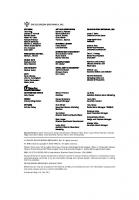Encyclopaedia Britannica [S2-US, 3 ed.]
American Supplements to the Third Edition
196 23 69MB
English Pages [753] Year 1803
Cover
Title
ELE
EUP
FIR
FRA
GAL
GEO
GLU
GUN
HAW
HOU
JEB
IMP
IMP
INS
JOH
KAN
LAM
LIC
MAC
MAC
MAG
MAG
MAN
MAS
MIC
MIN
MIN
MIN
MON
MOZ
NAV
NEW
NEW
NOR
ORF
PAR
PEP
Recommend Papers
![Encyclopaedia Britannica [S2-US, 3 ed.]](https://ebin.pub/img/200x200/encyclopaedia-britannica-s2-us-3nbsped.jpg)
- Author / Uploaded
- Encyclopaedia Britannica
File loading please wait...
Citation preview
iiiiiiiiii
UNIVERSITY OF CALIFORNIA
AT LOS ANGELES
:
—
SUPPLEMENT TO THE
ENCYCLOPEDIA, OR
DICTIONARY OF
ARTS,
SCIENCES, AND
MISCELLANEOUS LITERATURE. IN
THREE VOLUMES.
Illustrated with Copperplates.
NON IGNORO QU^ BONA SINT, FIERI MELIORA POSSE DOCTRINA, ET QU.E NGN OPTIMA, ALIQUO MODO ACUI TAMEN, ET CORRIGI POSSE. CiCERO.
VOL. ELE
II.
PHI
^|)ilatjelpi)ia PRINTED Br BUDD AND B^RTR.iM,
FOR TIIOiMAS DOBSON, AT THE STONE HOUSE, N" 41, SOUTH SECOND STREET. 1803.
AE5
SUPPLEMENT TO
T.HE
ENCYCLOPAEDIA. L E
E Elfarome''^'-
T^ LECTROMETER,
—
A
cademy of for
Sciences at Paris, defcribed in the
Memoirs
1785.
Mr Coulomb had made fome experiments in examiDr Hooke's theory of fprings " ut tenjlo ftc
nation of vis ;"
gard
and found, that
it
was
furprifingly exad, in re-
force neceifary for twilling eladic wires. fufpended a nicely turned metal cylinder by a
to the
Having
and having given
fine wire in the direiftion of its axis, it
feveral turns,
and
left
it
to regain its natural pofilion,
revolution of untvv'illlng and twilling in times precifcly equal, whether ihefe oTcillations were of a few degrees, or confiiled of
heobferved, that
it
performed
all its
He thence concluded, that the force with which the wire endeavoured to regain its natural pofition was exactly proportional to its dillance from it. Engaged, foon after, by order from the Minifter of Marine, in an examination of the phen^ mcna feveral revolutions.
of the mariner's compals, he took this method of fufpcnding his needles, in order 10 obtain exafl me.ifures of the forces which caul'td them to deviate from the magnetic meridian. He made ibmc obfervations with needles I'o fulpendcd ; whicii are highly valuable to the When Iiis fuccefs philulbpher engaged in that liudy. in this relearch had fully gratilie J liis wifhes, he turned his thuughis 10 the exuinina'ion ot tlie law of electiic aiflion by the help of an ck Urometer liifpendcd in the
fame manntr.
ABDC
Plate
XXVII.
It is con(lru(5leJ as
(li^.
inclies in dianictjr
a
I.)
and
loUovs
repreiVnts a gl in heiglit.
ifs
This
:
cylinder, is
12
covered by on the un-
it by a prcjciSing fillet This cover is pierced with two round SuppL. Vol. II.
gl.ifs
plate fitted to
der lurlace.
L E
E
an inarument which meaI J lures the quantity of ele>5lricity in any eleiflrified The moll common elecflrometers are defcribed body. in the article Electricity (EncycL), n" 27, and 182 very valuable one is likewile defcribed in n° 233. 85. of the article Electricity in this Supplement; but there are ftill two eleftrometers, of which we have hitherto given no account, though they are of fuch value, that to pals them unnoticed would be unpardonThe firft, which is by much the moll accuable. rate and delicate inflrument of the kind that we have leen, was invented by Mr Coulomb, and is adapted to afcertain the fmalled quantity of redundant electricity. The fecond is a late invention of Mr Cuthbertfun, the ingenious improver of the air-pump, and is employed only to meafure the charge of large jars and batteries. Electrometer, by Mr Coulomb of the Royal Ais
holes of i|th inches in diameter. One of them Is in Elcar





![Encyclopaedia Britannica [10, 3 ed.]](https://ebin.pub/img/200x200/encyclopaedia-britannica-10-3nbsped.jpg)
![Encyclopaedia Britannica [24, 11 ed.]](https://ebin.pub/img/200x200/encyclopaedia-britannica-24-11nbsped.jpg)
![Encyclopaedia Britannica [11, 8 ed.]](https://ebin.pub/img/200x200/encyclopaedia-britannica-11-8nbsped.jpg)
![Encyclopaedia Britannica [18, 8 ed.]](https://ebin.pub/img/200x200/encyclopaedia-britannica-18-8nbsped.jpg)
![Encyclopaedia Britannica [11, 4 ed.]](https://ebin.pub/img/200x200/encyclopaedia-britannica-11-4nbsped.jpg)